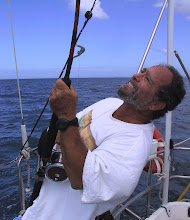
There are hard currencies. There are soft currencies. Right now the US dollar can purchase anything that can money can buy on this planet. Oil and diamonds and commodities in trade are denominated in dollars. It is a hard currency, and if a country is lucky enough to have foreign trade with the USA, or is pretty enough to attract tourism, they will have a flow of hard currency backed by the full faith and credit of the United States of America.
Soft currencies? Try converting dinars to dollars, or baht to euros. Outside of Kuwait or Thailand, no bank will touch dinars or baht.
This dollar hegemony was established in 1944 at a meeting of the major countries at Bretton Woods. It is 65 years now, but the dollar (and recently the Euro) is still the most commonly held foreign reserve currency by nearly every country today. Until 2002, the dollar constituted 70% of the world’s reserves. The Euro is a newcomer. Now the Euro is about 30%.
The value of a currency is primarily an act of faith and partly a matter of agreement. All currencies today are fiat money, created at the whim of the controlling governments. However, if a treasurer maintains the necessary restraint to make sure the country’s currency supply grows about as fast as the economy, that faith is underpinned by a modicum of substance. When an economy gyrates wildly, when fiscal policies lead to enormous deficits, when the money supply is deliberately exploded in the face of declining GNP, that faith stumbles. Faith in the US dollar is tottering around right now like rheumatic on a binge.
If you believe in conspiracy theories, you will recognize this plight. The fattest sheep have been shorn and it is time to buy up the next herd with the proceeds. China, Japan, India, Brazil, South Korea and Russia have, as a group, vast economic potential. They are clamoring for a bigger role in global financial affairs. Why not have a new Bretton Woods deal and let them in? Of course, where as now the entire word’s reserves are controlled by the US Federal Reserve System, we can not have this power pass to just anyone, can we?
So, struggling to find a charter, here comes the International Monetary Fund and it’s partner, the World Bank. Both of these institutions arose from the Bretton Woods system. They are essentially controlled by the United States. The USA is the largest shareholder, by far the largest contributor of capital, and, by “gentleman’s agreement” the top executive is an American banker. The IMF loans money to developing and third world countries. They take collateral in return, such as title to thousands of square miles of rainforest in Brazil, tin mines in Malaysia, and the banks in Iceland. They also impose harsh conditions on their debtor nations, such as severe fiscal restraint and high taxes. These loans are interest bearing. The taxes are key to the payment of interest, just as they were in 1913 when the US set up the Federal Reserve. We have seen how this system is a game of musical chairs. and the IMF wants to control the music.
The IMF takes the basket of assets they hold and issues a from of currency, called Special Drawing Rights, or SDR’s. They are only issued to sovereign nations, so they have limited value as a currency right now.
That is exactly what the IMF wants to change. The plan is to create a “basket” of currencies, including the dollar, yen, renminbi, euro, cruzero, and ruble, and call this the basis for the valuation of an SDR. All currencies will be valued on their ratios in this basket. Raising or lowering this ratio will have profound effects on the fortunes of the affected countries, effects that their individual treasuries will not be able to counter without dire consequences. These SDR’s will be fiat money, expanded or contracted at the whim of the IMF. They will be loaned, at interest, to sovereign national banks as a base to their individual currencies. These loans will be at interest. The interest will be secured against mandated tax levels.
The net effect of these rules will be to consolidate the same financial structure we now suffer under the Federal Reserve, but on a global scale. If you are a conspiracy subscriber, they are about to achieve their goal of global monetary hegemony.
Geithner has recently recommended (!) that the US reduce it’s ownership of the IMF and World Bank, relinquishing control to a broader international group. Just who is Geithner, and why is he so willing to undercut the reserve dollar? China holds about $2 trillion in US debt and claims to be worried about the safety of their investment. How will they convert their US holding to SDR’s and what will that do to the US economy? Russia resents the universal dollar denomination of oil contracts and wants then denominated by a basket of currencies. If all this transpires the dollar will lose its value and the price of oil in the US will zoom upwards.
The decline of the dollar cannot be accomplished without the accompanying decline of the USA itself. I don’t want to see that happen.


No comments:
Post a Comment